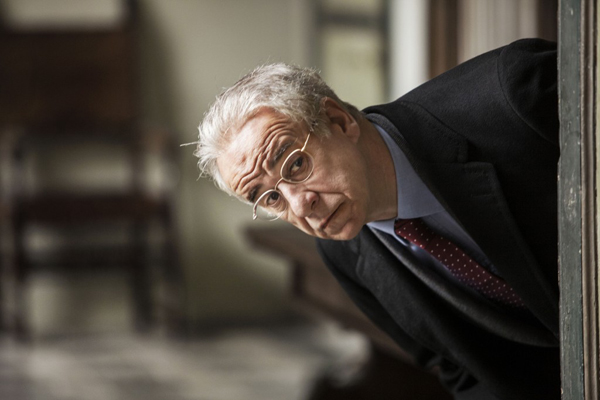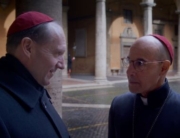This shape-shifting political drama-cum-satire begins in a staid, stately fashion and on an ominous note, to the overture of Verdi’s hothouse opera La Forza del Destino. A trim, tall, bespectacled gentleman saunters through a vast, marble hall (which screams Power), led by two younger aids. He stops for a moment and asks if he has time to run to the bathroom. With a sigh that doesn’t conceal her annoyance, one functionary tells him no, that he should’ve asked earlier, and the elder man, Enrico Oliveri (Toni Servillo), does as he is told, moving straight ahead to deliver a perfunctory speech before his party delegates, one stop on his campaign for the office of prime minister.
Up to this point, Servillo offers a reticent performance; he practically recedes into the background. Thus, it’s with little resistance that Enrico’s perfunctory spiel is hijacked by a heckler planted in the audience by an opposition party. Understandably, the man-who-doesn’t-want-to-be-there leaves his Rome apartment in the middle of the night and vanishes, without a trail for his colleagues to follow. Enrico winds up unannounced on the doorstep of an ex-girlfriend he hasn’t seen in decades, Danielle (Valeria Bruni Tedeschi), in Paris, for “a few days to breathe.” (The on-site locations are eye candy.)
Now the film shifts gears, thawing out to become a low-key, winsome comedy of human foibles, taking a page out of The Comedy of Errors playbook. Back in Rome, Enrico is supposed to attend a pan-European political conference and deliver a keynote speech. To save face, his campaign manager, Andrea (the barely unflappable Valerio Mastandrea), proceeds with a plan: to pass off Enrico’s identical twin brother, the easy-going and compliant Giovanni (Servillo, serving double duty), as the candidate, though he’s just out from his stay at a mental institution.
No viewer will have difficulty distinguishing who’s who. Besides sporting gray hair, Giovanni, a noted philosopher, looks like a slaphappy Buddha with a perpetual grin. The placid Enrico, on the other hand, takes some time to warm up to; he’s like a taciturn grandfather who withholds approval.
The script nimbly avoids becoming too plot heavy. For one, those closest to the twins are in on the switch, and the film’s sly sense of humor emerges from how they react and how relationships change—for the better. It moves away from the comedic complications of the setup and instead focuses on how the twins amicably adjust to their new, virtually drama-free worlds. Viva so skillfully depicts its ensemble that viewers don’t doubt the trading-places premise because of the portrayals of the twins, Enrico’s wife, or Enrico’s new surrogate family when he becomes a part of a film crew. This happens after he joins script supervisor Danielle on location. The overall vibe is so feel-good that Danielle’s filmmaker husband treats Enrico like a fratello as opposed to a rival.
As a result of the swap, the twins are both revitalized. (And Italy? Maybe.) Campaigning, Giovanni-as-Enrico makes waves, rejuvenating his brother’s floundering campaign and altering the political landscape. At one point, he’s compared to Obama, circa 2008. In fact, this film might be the most hopeful in some time that touches upon Italian politics. There’s no poke in the eye, as in The Great Beauty, or the complicated machinations in Paolo Sorrentino’s heavier Il Divo. For a story that is rooted in the here and now, it breaks free of the insular, becoming a light-footed fellow traveler with Ivan Reitman’s optimistic Dave (1993), without a heavy or the shtick.







Leave A Comment